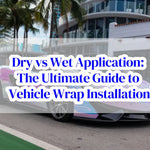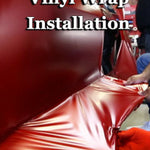PVC: The Dominant Force in Vehicle Wraps
What is PVC?
PVC is a versatile thermoplastic polymer prized for its flexibility, moldability, weather resistance, and chemical stability. Its cost-effectiveness makes it the industry-standard base for color-change films.

The Ubiquitous Polymer
Beyond wraps, PVC is used in construction pipes, wire insulation, medical devices, and furniture. For automotive films, it's engineered with plasticizers, stabilizers, and pigments into a conformable, high-performance material.

Q1: Why is cast PVC wrap 30-50% more expensive than calendered?
A: Cast PVC undergoes a slow, precision-cured process (like hand-poured resin) for flawless molecular density. Calendered PVC is mass-rolled like dough – faster/cheaper but sacrifices uniformity.
Q2: Will pink fade faster on my car with calendered PVC?
A: Yes. Calendered PVC’s porous structure absorbs UV/heat → pink turns chalky in 1-2 years. Cast PVC’s dense “armor” blocks fading (even in bright colors).
Q3: Which handles complex curves without lifting?
A: Cast PVC. It stretches like memory foam around bumpers, mirrors, and recesses. Calendered PVC fights tension → edges rebound or wrinkle (especially in cold/heat).
Q4: Why does matte pink look cheaper on calendered film?
A: Roller marks. Calendered production leaves microscopic texture that amplifies on matte finishes → “orange peel” effect. Cast’s liquid-cured surface stays glass-smooth.
Q5: Can heat cause shrinkage after installation?
A: Only with calendered PVC. Its stressed molecules contract when heated (sun/wash), pulling edges up. Cast retains shape permanently.

Orange Peel Culprit? Material Matters!
"Orange peel" texture (uneven, dimpled surfaces) plagues many matte wraps. Calendered PVC is a primary cause:
-
Roller Marks: Manufacturing imperfections magnified on matte surfaces.
-
Low Conformability: Fails to stretch smooth during installation.
-
Uneven Shrinkage: Worsens texture during heating/cooling.
Cast PVC's inherent smoothness and stretch eliminate orange peel for premium finishes.
Production
Traditional PVC/plasticizers raise concerns. Industry shifts:
- Eco-friendly Calcium-Zinc (Ca/Zn) stabilizers replacing heavy metals.
-
Bio-based plasticizers (e.g., plant-derived).
- Cleaner manufacturing.

In Use
Chemically inert → safe.
End-of-Life
Non-biodegradability is the challenge.
-
Solutions: Brand-led recycling programs for scrap/removed film; recyclable formulations.
-
Buy Smart: Choose brands disclosing eco-practices (Ca/Zn stabilizers, recycling).
Buyer's Guide: Identifying Quality PVC
-
Price & Brand: Ultra-low-cost "imported" films = likely calendered. Trust reputable brands (even entry-tier is often cast).
-
Warranty: Cast = 5-10 years; Calendered = 1-3 years. Long warranty = material confidence.
-
Sample Tests (if possible):
-
Stretch Test: Cast stretches far without whitening; calendered rips/whitens quickly.
-
Feel: Cast is thinner, softer, smoother. Calendered feels thicker/stiffer.
-
Surface Inspection: View matte samples under light – avoid orange peel.
-
Direct Question: Ask sellers: "Is this cast or calendered PVC?" Legitimate suppliers answer transparently.
-
eWarranty: Verify registrable eWarranty – terms often imply material grade.

Conclusion
PVC is the indispensable skeleton of the wrap world. Recognizing the cast vs. calendered divide empowers you to avoid pitfalls and invest in a truly superior film.
When choosing your vehicle's new skin, prioritize its foundation – demand cast PVC for lasting beauty, seamless fit, and premium texture.

















